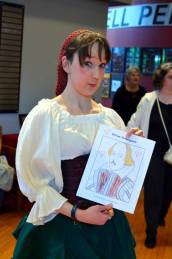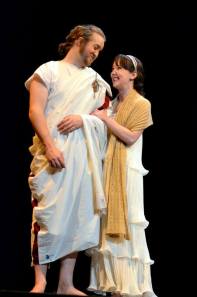A lot of people have spent a lot of time professing the timelessness and universality of Shakespeare’s works. I’m not going to do that here, although I am inclined to agree with those people, at least to an extent. I am, however, going to profess the magical magnetism of Shakespeare.
A few weeks ago, my community theatre organization presented “Bard in the Borough,” eighteen Shakespeare-inspired performance pieces that were independently directed and rehearsed before being cobbled together into a cohesive play one week before opening. We had sonnets, songs, scenes, spoofs, and skits all stuffed into one show and the beautiful thing is that it worked. It worked to call on community members to come forward with any Shakespeare-related piece they wanted to try. We were afraid that no one would step into to the spotlight, but Shakespeare has a way of drawing people out of the shadows. And older gentleman with a passion for Shakespeare’s sonnets shocked us with his accessible and powerful interpretation. A first time director, decided to seize this opportunity to grapple with the complex and riveting “To be or not to be” speech and subsequent “Get thee to a nunnery” scene. A busy mother of five could finally participate in a production because of the flexibility of the schedule and even though she didn’t particularly like Shakespeare, she had always found his insults amusing and created her own skit centered around a war of wit.
The list of opportunities to share and connect through Shakespeare continues: patrons stepping onto a mini stage in the lobby to deliver one of Shakespeare’s famous lines; students from the high school across the street performing their scene from “Much Ado About Nothing” because they had just learned it for English class; young people speaking the unfamiliar and poetic language of “A Midsummer Night’s Dream” with such enthusiasm that even the adults understood what was going on.
I guess all I’m trying to say here is that something magical happened that weekend. We took a bunch of pieces and put them all together into a single show and the only through-line was Shakespeare. Some might say his works are tired, overdone, or even not that great, but as a community theatre maker, I must say that I am grateful for the material he left us. His works are accessible, malleable, varied, and serve as a perfect playground for performers. Happy 450th Mr. Shakespeare! And thank you for being such an amazing vehicle for celebrating community.








